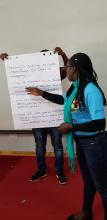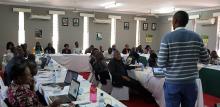WHO and UNICEF support the Ministry of Health to conduct a workshop for orientation of media personnel in emergency risk communication
Zambia is actively implementing the recommendations of the 2017 International Health Regulations 2005 Joint External Evaluation on building capacity for risk communication. The ongoing Ebola Virus Disease outbreak in the neighbouring Democratic Republic of Congo has increased the urgency of ensuring that the population is provided with timely information on how to prevent the disease and the recommended actions in case of importation of the disease in the country. In addition, the northern part of the country has experienced a cholera outbreak which demands that public communication through the mass media and other channels is strengthened.
As part of the ongoing national efforts to build capacity for risk communication, the World Health Organisation and UNICEF provided support to the Ministry of Health and the Zambia National Public Health Institute to train media personnel in emergency risk communication. The 3 - day workshop which was conducted from 9-11 July brought together media personnel from districts in Central, Copperbelt, Luapula, Northern and North Western Provinces which share borders with the Democratic Republic of Congo. The immediate aim of the workshop was to heighten media communications in light of the high risk of importation of the Ebola Virus Disease into the country. However, the general objective was to strengthen the knowledge and skills of journalists in order that they could communicate effectively and consistently before, during and after disease outbreaks and other health emergencies in their districts. The forum also facilitated the creation of a network of emergency communications journalists.
In his remarks to open the workshop, Dr. Raymond Hamoonga from the Zambia National Public Health Institute stated that the training of the Journalists in risk communication was organized by the Ministry of Health because media communication was a key component of risk communication in the National Action Plan on Health Security. He emphasised the need for the media to be actively involved in the preparedness activities for Ebola Virus Disease and other epidemic diseases such as cholera.
The focus of the workshop was on the role of the media in emergencies, risk communication strategies, WHO guidelines for emergency risk communication, the changing communication environment, use of social media, investigative journalism and media challenges and opportunities in risk communication. It was noted that skills building and development of journalists in emergency health reporting was limited. The Ministry of Health, WHO and UNICEF therefore committed to scaling up the training of journalists in health reporting to all community radio stations and other media in the country. It was also recommended that stronger partnerships between the Ministry of Health and the media be established.
The participants at the workshop included the provincial health promotion officers and media personnel who were mainly from community radio stations, national print and electronic media and the Zambia News and Information Services.






